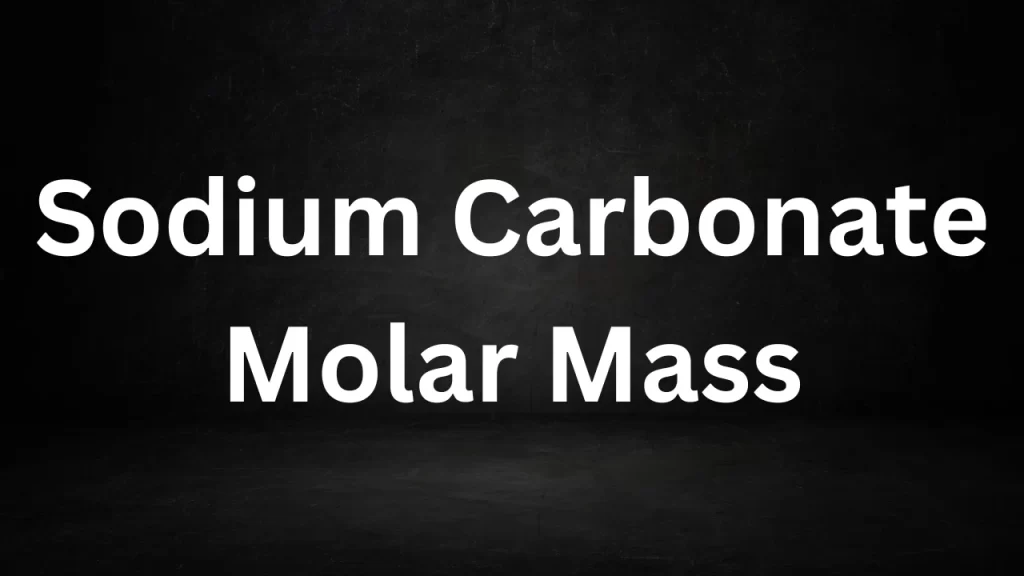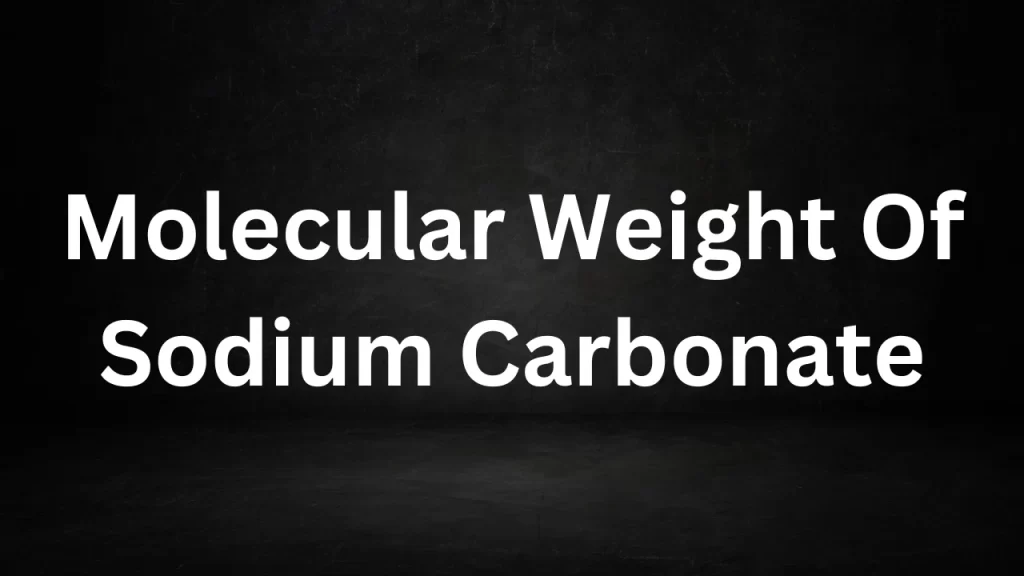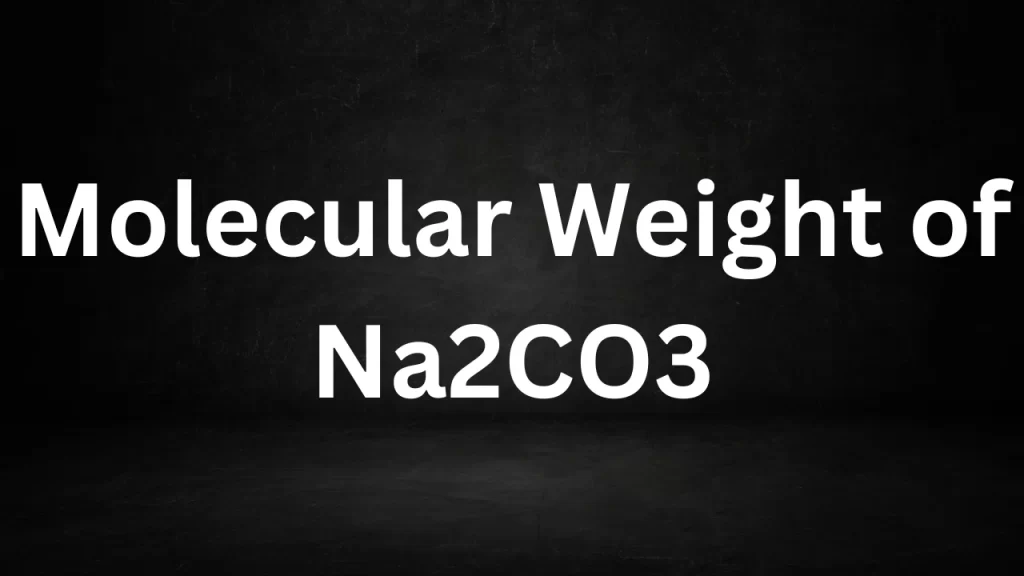Tag: molecular weight of sodium carbonate decahydrate na2co3 10h2o
Sodium Carbonate Molar Mass
Sodium Carbonate Molar Mass: Unveiling the Molecular Weight of Na2CO3 Molar mass, also known as molecular weight, is a fundamental concept in chemistry that plays a pivotal role in understanding and quantifying chemical reactions. In this article, we delve into the world of sodium carbonate (Na2CO3), a compound of significant importance in various industrial, scientific, and everyday applications, to explore its molar mass and its relevance in the realm of chemistry.

Sodium Carbonate Molar Mass
What is Molar Mass?
Molar mass is the mass of a substance expressed in grams per mole (g/mol). It represents the weight of one mole of that substance, where a mole is a unit that contains approximately 6.022 x 10^23 particles, be they atoms, molecules, ions, or any other entity. Molar mass is crucial in chemistry because it helps determine the quantity of a substance involved in a chemical reaction, making it an essential tool for stoichiometry and analytical chemistry.
Calculating the Molar Mass of Sodium Carbonate (Na2CO3)
To determine the molar mass of sodium carbonate (Na2CO3), we follow these steps:
1. Identify the elements: Sodium carbonate consists of three elements: sodium (Na), carbon (C), and oxygen (O).
2. Find the atomic masses: Consult the periodic table to find the atomic masses of each element.
- Atomic mass of Na ≈ 22.99 g/mol
- Atomic mass of C ≈ 12.01 g/mol
- Atomic mass of O ≈ 16.00 g/mol
3. Determine the number of atoms: In sodium carbonate, there are two sodium (Na) atoms, one carbon (C) atom, and three oxygen (O) atoms.
4. Multiply and sum: Calculate the molar mass by multiplying the atomic mass of each element by the number of atoms of that element in the compound and then summing these values.
- Molar Mass of Na2CO3 = (2 x Atomic Mass of Na) + (1 x Atomic Mass of C) + (3 x Atomic Mass of O)
- Molar Mass of Na2CO3 = (2 x 22.99 g/mol) + (1 x 12.01 g/mol) + (3 x 16.00 g/mol)
- Molar Mass of Na2CO3 ≈ 105.99 g/mol
Hence, the molar mass of sodium carbonate (Na2CO3) is approximately 105.99 grams per mole (g/mol).
Significance of Sodium Carbonate’s Molar Mass
Understanding the mol mass of sodium carbonate holds practical significance in several areas:
- Chemical Reactions: It is vital for determining the amount of sodium carbonate required or produced in chemical reactions, making it essential for proper dosing and yield estimation.
- Stoichiometry: Sodium carbonate’s molar mass plays a critical role in stoichiometric calculations, facilitating the precise relationship between reactants and products in chemical reactions.
- Industry Applications: Industries, including the detergent, glass, and chemical manufacturing sectors, rely on accurate molar mass values for process optimization and quality control.
- Analytical Chemistry: Mol mass information is invaluable in analytical techniques such as mass spectrometry, aiding in the identification and quantification of substances in samples.
- Household Uses: Sodium carbonate, commonly known as soda ash or washing soda, is used in various household applications, including cleaning, pH adjustment, and water softening.
To sum up, the mol mass of sodium carbonate is a fundamental factor in chemistry, allowing precise measurements and applications. In industry, research, or daily life, a solid grasp of molar mass calculations is crucial for accurate chemical analysis.
Read More
- Layers Of The Earth
- Environmental Pollution And Recycle
- Batteries In Series Parallel
- Difference Between Work And Energy
- Difference Between Concave Convex Lens
Frequently Asked Questions (FAQs) Sodium Carbonate Molar Mass
1. What is sodium carbonate, and why is its molar mass important?
Sodium carbonate, also known as soda ash or washing soda, is a chemical compound with the formula Na2CO3. Its molar mass is important because it allows us to calculate the amount of sodium carbonate in chemical reactions and solutions accurately.
2. How is the molar mass of sodium carbonate calculated?
- To find the mol mass of sodium carbonate (Na2CO3), sum the atomic masses of its elements: sodium (Na), carbon (C), and oxygen (O). The formula for calculating it is:
- Calculate the molar mass of Na2CO3 by adding: 2(Atomic Mass of Na) + Atomic Mass of C + 3(Atomic Mass of O).
3. What are the atomic masses of the elements in sodium carbonate?
- Atomic mass of Na (sodium) ≈ 22.99 grams per mole (g/mol)
- Atomic mass of C (carbon) ≈ 12.01 g/mol
- Atomic mass of O (oxygen) ≈ 16.00 g/mol
4. What is the molar mass of sodium carbonate (Na2CO3)?
The mol mass of sodium carbonate is approximately 105.99 g/mol.
5. Why is molar mass important in chemical reactions?
Molar mass is crucial for stoichiometry, a branch of chemistry that deals with the quantitative relationships between reactants and products in chemical reactions. It allows chemists to calculate the precise amounts of substances involved in reactions.
Molecular Weight Of Sodium Carbonate
Molecular Weight Of Sodium Carbonate: Sodium carbonate, commonly known as soda ash or washing soda, is a chemical compound with the molecular formula Na2CO3.
Understanding its molecular weight is fundamental in various fields, including chemistry, industry, and environmental science.
In this article, we delve into the concept of molecular weight and explore the significance of knowing the molecular weight of sodium carbonate.

Molecular Weight Of Sodium Carbonate
Definition of Molecular Weight
Molecular weight, also known as molar mass or molecular mass, is a measure of the mass of a molecule. It is defined as the sum of the atomic weights (masses) of all the atoms in a molecule. The unit of molecular weight is the atomic mass unit (amu) or unified atomic mass unit (u). For convenience, molecular weights are often expressed in grams per mole (g/mol).
Calculating the Molecular Weight of Sodium Carbonate
To calculate the molecular weight of sodium carbonate (Na2CO3), we need to sum the atomic weights of all the constituent atoms:
- Sodium (Na) has an atomic weight of approximately 22.99 amu.
- Carbon (C) has an atomic weight of roughly 12.01 amu.
- Oxygen (O) has an atomic weight of about 16.00 amu.
Now, let’s calculate the molecular weight:
Molecular Weight of Na2CO3 = (2 * Atomic Weight of Na) + Atomic Weight of C + (3 * Atomic Weight of O)
Molecular Weight of Na2CO3 = (2 * 22.99 amu) + 12.01 amu + (3 * 16.00 amu)
Mole Weight of Na2CO3 ≈ 45.98 amu + 12.01 amu + 48.00 amu
Mole Weight of Na2CO3 ≈ 105.99 amu (or g/mol)
So, the molecular weight of sodium carbonate is approximately 105.99 g/mol.
Significance of Mole Weight of Sodium Carbonate
Understanding the mole weight of sodium carbonate holds several practical implications:
- Chemical Formulation: The mole weight provides the exact mass of one mole of sodium carbonate molecules. This is essential for precise chemical formulations and reactions in laboratories and industries.
- Stoichiometry: In chemical reactions, the molecular weight plays a crucial role in stoichiometry, helping scientists and engineers determine the quantities of reactants and products.
- Dosage Calculation: In various applications, such as water treatment and detergents, the molecular weight is vital for calculating the appropriate dosage of sodium carbonate needed to achieve specific results.
- Environmental Impact: In environmental science, understanding the molecular weight aids in assessing the impact of sodium carbonate on ecosystems and water quality when it is used or released.
- Quality Control: Industries that produce sodium carbonate products rely on accurate molecular weight data to maintain quality control standards.
In conclusion, the mole weight of sodium carbonate, approximately 105.99 g/mol, is a crucial parameter in various scientific, industrial, and environmental contexts. It enables precise calculations, formulations, and assessments, ultimately contributing to the efficient and responsible use of this important chemical compound.
Read More
- Difference Between Isothermal And Adiabatic Process
- Simple Harmonic Motion Examples
- Molecular Mass Of Calcium
- Lumen Meaning In Biology
- Molar Mass of Chlorine
Frequently asked questions (FAQs) On Mole Weight Of Sodium Carbonate
1. What is the mole formula of sodium carbonate?
The mole formula of sodium carbonate is Na2CO3, indicating that each molecule contains two sodium (Na) atoms, one carbon (C) atom, and three oxygen (O) atoms.
2. What is the mole weight of sodium carbonate?
The mole weight of sodium carbonate (Na2CO3) is approximately 105.99 grams per mole (g/mol).
3. Why is it important to know the mole weight of sodium carbonate?
Knowing the mole weight is essential for accurate chemical calculations, including determining reactant and product quantities in chemical reactions, dosage calculations in various applications, and quality control in industries.
4. How is the mole weight of sodium carbonate calculated?
The mole weight of sodium carbonate is calculated by summing the atomic weights of all the constituent atoms in its chemical formula: 2 * Atomic Weight of Sodium (Na) + Atomic Weight of Carbon (C) + 3 * Atomic Weight of Oxygen (O).
5. What are some common uses of sodium carbonate in everyday life?
Sodium carbonate has a wide range of applications, including as a cleaning agent (in laundry detergents and household cleaners), in water treatment, as a food additive, and in various industrial processes.
Molecular Weight of Na2CO3
Molecular Weight of Na2CO3: Sodium carbonate, with the chemical formula Na2CO3, is a compound commonly known as soda ash or washing soda.
It plays a significant role in various industrial processes and applications, including glass production, detergent manufacturing, and water treatment.
Understanding the molecular weight of Na2CO3 is essential for both theoretical and practical purposes. In this article, we will explore the molecular weight of sodium carbonate and its significance in chemistry and industry.

Molecular Weight of Na2CO3
The Composition of Sodium Carbonate (Na2CO3)
Before diving into the molecular weight of sodium carbonate, let’s break down its chemical composition:
- Sodium (Na): Sodium has an atomic mass of approximately 22.99 atomic mass units (amu).
- Carbon (C): Carbon has an atomic mass of approximately 12.01 amu.
- Oxygen (O): Oxygen has an atomic mass of approximately 16.00 amu.
- Sodium carbonate (Na2CO3) consists of two sodium atoms (Na), one carbon atom (C), and three oxygen atoms (O).
Calculating the Molecular Weight of Na2CO3
To find the molecular weight of sodium carbonate (Na2CO3), we sum the atomic masses of its constituent atoms according to the chemical formula:
Molecular Weight of Na2CO3 = (2 × Atomic Mass of Na) + Atomic Mass of C + (3 × Atomic Mass of O)
The Molecular Weight of Na2CO3 = (2 × 22.99 amu) + 12.01 amu + (3 × 16.00 amu)
Molecular Weight of Na2CO3 = 45.98 amu + 12.01 amu + 48.00 amu
Molecular Weight of Na2CO3 ≈ 105.99 amu
So, the mol weight of sodium carbonate (Na2CO3) is approximately 105.99 atomic mass units (amu) or 105.99 grams per mole (g/mol).
Significance of Molecular Weight in Sodium Carbonate
The mole weight of sodium carbonate is crucial for several reasons:
- Stoichiometry: In chemical reactions involving sodium carbonate, its molecular weight is used to calculate the amounts of reactants and products. This is essential for balancing chemical equations and determining reaction yields.
- Dosing in Water Treatment: Sodium carbonate is used in water treatment to adjust pH levels and soften water. Knowledge of its molecular weight helps in dosing calculations to achieve the desired treatment results.
- Manufacturing Processes: Industries such as glass manufacturing and detergent production rely on sodium carbonate as a key ingredient. Accurate molecular weight values are vital for quality control and formulation.
- Analytical Chemistry: In analytical chemistry, sodium carbonate can be used as a standard for titrations. Precise molecular weight values are essential for accurate analytical procedures.
Conclusion
The mole weight of sodium carbonate (Na2CO3), approximately 105.99 amu or 105.99 g/mol, is a fundamental property that underlies its various applications in chemistry and industry. Whether used as a reactant in chemical processes, a water treatment agent, or an essential component in manufacturing, understanding the molecular weight of sodium carbonate is essential for ensuring the efficiency and effectiveness of these processes. This versatile compound continues to be a vital player in numerous industrial and scientific endeavors.
Read More
- Molecular Mass Of Sodium
- Molecular Mass of Sucrose
- Molecular Mass of Chlorine
- Molar Mass Of C2H5OH
- Molecular Weight of Co2
Frequently Asked Questions (FAQs) Molecular Weight of Na2CO3
What is the mole weight of Na2CO3?
The mole weight of sodium carbonate (Na2CO3) is approximately 105.99 atomic mass units (amu) or 105.99 grams per mole (g/mol). It is calculated by adding the atomic masses of its constituent atoms according to the chemical formula.
Why is it important to know the molecular weight of Na2CO3?
Knowing the molecular weight of sodium carbonate is crucial for various reasons, including stoichiometry in chemical reactions, dosing in water treatment, formulation in manufacturing processes, and analytical chemistry procedures.
What are some common uses of sodium carbonate (Na2CO3)?
Sodium carbonate, also known as soda ash or washing soda, is used in a wide range of applications. It is used in glass production, detergent manufacturing, water treatment for pH adjustment, and as a cleaning agent in household and industrial settings.
How is the mole weight of Na2CO3 calculated?
The mole weight of Na2CO3 is calculated by summing the atomic masses of its constituent atoms. In the case of sodium carbonate, you add the atomic masses of two sodium (Na) atoms, one carbon (C) atom, and three oxygen (O) atoms.
Can sodium carbonate be used in food or as a food additive?
Yes, sodium carbonate is used in the food industry as a food additive with the code E500. It is used in some food products, including baked goods, as a leavening agent to help dough rise.